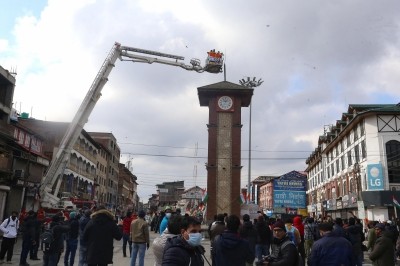
Srinagar, In J&K's whirlwind shift of political ideologies, one is now obliged to ask a local politician to which party he/she belongs at the moment.
Politics has been the art of the possible, but in Kashmir's fast changing political realities, it has also become the art of the impossible.
Not only have the mainstream political leaders and workers been changing loyalties, but those claiming to be hardcore separatists are also seen speaking a different language now.
Flock poaching is nothing new to mainstream political parties in J&K.
Senior leaders of one party have left it to join the other in the past, but not on such a large-scale as today.
One of J&K's senior most politicians, Ghulam Nabi Azad left the Congress after 52 years to form his own party, the Democratic Azad Party (DAP).
Other senior Congress leaders, Taj Mohiuddin, Tara Chand, G.M. Saroori, Abdul Majid Wani and others left the Congress to stand with Azad.
Senior politician and former deputy chief minister, Muzaffar Hussain Beigh left the Peoples Democratic Party (PDP), former PDP ministers, Altaf Bukhari, Sajad Lone, Basharat Bukhari also left the PDP.
Altaf Bukhari formed his own political party, J&K Apni Party, Sajad Lone continued his father's political party, the People's Conference (PC) and Basharat Bukhari joined Sajad.
Other senior PDP leaders like Nizamuddin Bhat, Peerzada Mansoor and Abbas Wani have left the party and joined Sajad Lone.
Senior Congress leader, Abdul Gani Vakil also joined Sajad Lone's PC.
Interestingly, Sajad's brother, Bilal Lone continues to represent the PC in the separatist Hurriyat Conference.
Bilal recently visited his native Handwara town and told a gathering of supporters that he would soon be 'taking a big step forward' with the support of the people.
Obviously, Bilal was disclosing his intention to join the mainstream politics by parting ways with the separatist Hurriyat Conference. When he formally parts ways with the Hurriyat is now only a matter of time.
One of the prominent leaders of the National Conference (NC), Devender Singh Rana, left the party and joined the BJP along with a dozen senior leaders, including former deputy mayor of Jammu municipal corporation, Dharamvir Singh.
Rana is the younger brother of senior BJP leader and Minister of State (PMO), Dr. Jatindra Singh.
Senior NC leader, Surjit Singh Slathia also left it to join the BJP with Devender Singh Rana.
Rana was the provincial president of the NC and his departure from the party is believed to cost it heavily during the forthcoming Assembly elections.
Former NC MLA, Sheikh Ishfaq Jabbar and his wife, Nuzhat Ishfaq, who is the chairperson of the district development committee Ganderbal, have practically left the NC and their announcement to join the BJP is now awaited.
Another senior NC leader, Syed Akhoon, who is Sheikh Ishfaq Jabber's father-in-law, has been shown the exit because of the anti-NC activities of his daughter, Nuzhat and son-in-law, Ishfaq.
What is most surprising in this entire political churning is that many senior members of the Pro-Pakistan Tehreek-e-Hurriyat (formed by late hardline separatist leader Syed Ali Shah Geelani) and the Jamaat-e-Islami have either parted ways with the pro-Pakistan politics or joined some mainstream political party on the sly to escape action from the security forces.
There were times in Kashmir when anyone claiming allegiance with any centrist party would be treated as a social outcaste.
Supporters of Sheikh Mohammad Abdullah, the founder of the NC, at the behest of his deputy, Mirza Afzal Beg, boycotted attending the funerals of those who stood by India during the Sheikh's incarceration.
After the abrogation of Article 370, Kashmir appears to have undergone a churning of ideologies.
While those in mainstream politics continue to swing from one side to the other like the pendulum, those once claiming to be staunch supporters of independence or Kashmir's merger with Pakistan have suddenly undergone a change of heart!
They now publicly claim that they never supported violence!
They have become parrots of Kashmir's communal harmony, Sufist tolerance and advocates of keeping religion out of politics.


.jpeg)

